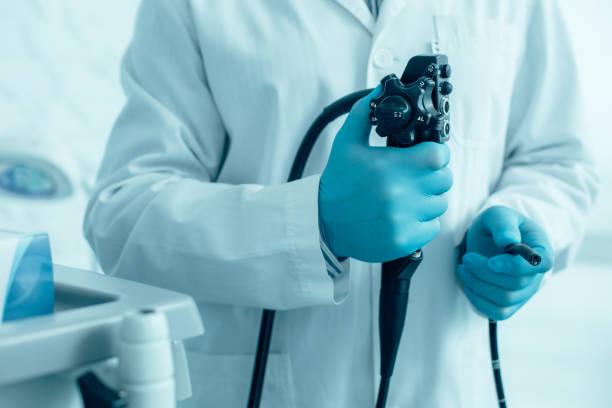Best endoscopy specialist in South Mumbai
What is meant by Endoscopy?

The inside anatomy of the body is examined with an endoscope, a flexible, illuminated device. Typically, a natural entrance in the body, like the mouth or anus, is used to introduce an endoscope. The most frequent endoscopic procedures assess the esophagus, stomach, and some parts of the intestine, while endoscopy can also involve the evaluation of other organs.
There are numerous varieties of endoscopy. The names of some of them and how they appear are as follows:
- Joint arthroscopy
- Lungs: bronchoscopy
- Large intestine sigmoidoscopy and colonoscopy
- Urinary system: a cystoscopy and ureteroscopy
- Laparoscopy: pelvis or abdomen
- Esophagus and stomach examined during an upper gastrointestinal endoscopy
Upper gastrointestinal (GI) endoscopies for stomach-related disorders and colonoscopies for colon cancer screening are two of the more popular endoscopies; both are carried out by gastroenterologists because they specialise in the digestive system.
Your healthcare professional can examine the oesophagus, stomach, and first section of the small intestines during an upper endoscopy for further investigation, possibly to evaluate symptoms like upper abdominal pain, identify the cause of suspected internal bleeding, or scan for malignancies. The endoscope is often inserted for this kind of endoscopy through the mouth and down into the abdomen.
Colonoscopies are frequently performed in order to identify and keep an eye on any alterations or anomalies in the large intestine (colon). In this situation, the anus would be used to introduce the endoscope. For those who are older or have certain risk factors for colon cancer, colonoscopies are routinely utilised as a suggested screening method.
If your healthcare professional needs to look into, confirm, or treat a suspected condition in a particular area, they will choose which form of endoscopy is best for you. For instance, if you have unexplained symptoms like stomach pain, vomiting, or difficulty breathing or swallowing, your doctor may decide to use an endoscope to diagnose the problem.
The use of endoscopy for a biopsy may also be possible if there is worry that you may have an illness like cancer. Or, a condition can be treated directly with an endoscopy by having a polyp removed or a joint problem fixed.
You should be aware that while most endoscopic treatments are typically safe and seldom result in major consequences, there is always a chance of infection due to being in a hospital setting or an adverse event occurring either during or after the surgery.
Most endoscopies only result in minor problems. Any minor issues would, if anything, be discovered during the surgery or within a few days, and your medical staff would be able to rapidly handle them.
Serious consequences are less frequent, although they could result in bleeding, a perforation of the bowel, or a rupture in the lining of the inner intestine. Additionally, there is always a risk of negative outcomes whenever anaesthetic is used. Make sure to tell your healthcare provider about your medical history and any particular concerns.
At the Institute of Liver Diseases’ Department of Hepatology, Dr. Chetan Kalal is now the Consultant. He is regarded as one of the Best Endoscopy specialists in South Mumbai. He is a top hepatologist and liver expert. He has received numerous honors, the most notable of which is the coveted AASLD Foundation Award in 2016 and 2017.
Liver illnesses are his main area of research interest. He has spoken at worldwide and national events and published in peer-reviewed journals. He has published more than 20 original pieces in international and national journals. He has also participated in a number of international clinical studies on the development of novel drugs.


